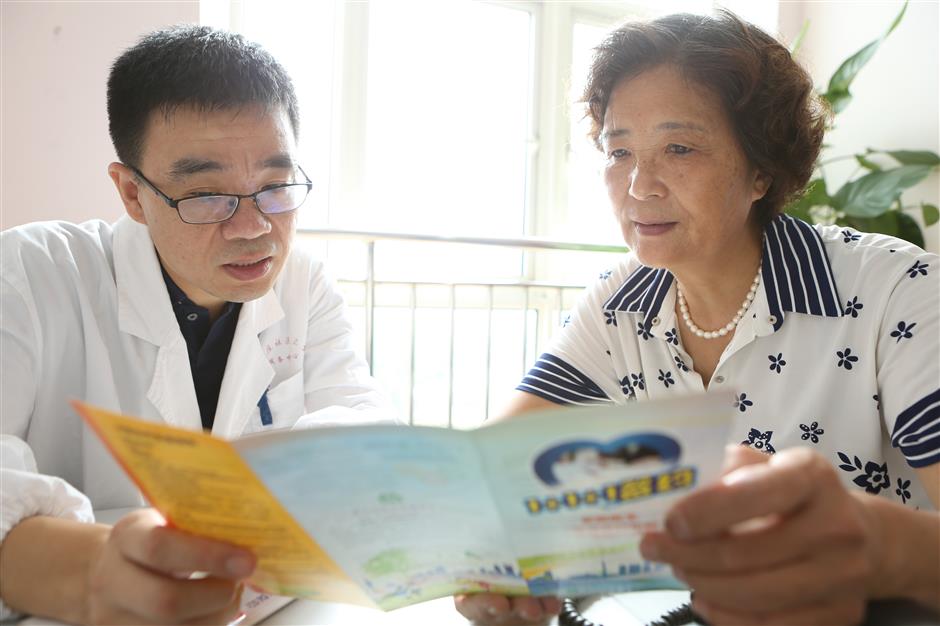Family doctor advances community health
Gu Hao, a doctor who serves the 4,500 residents of the Xinmei community, is at the forefront of government efforts to promote family doctors as the front line of health care services.
Family doctors, or general practitioners, are a relatively new concept in China, where people traditionally go to hospitals for all their medical services. Doctors like Gu provide initial screening of patients. Those requiring specialists or hospital care are referred on; those with more minor problems are treated in community-based clinics.
Shanghai implemented its version of the new health care model in 2011. It was designed not only to provide greater convenience to residents but also to alleviate overcrowding in public hospitals. Today, there are about 239 community health care centers across the city.
The city’s goal is to have a family doctor for every 2,500 residents by the year 2020. That goal is still far from being reached. In the Xinzhuang area of Minhang District, there are 53 community health care centers, each with one family doctor and covering 290,000 residents.

Gu Hao gives a speech after he and his team were honored as “the most beautiful family doctors” by China Central Television. Gu, a family doctor in the Xinmei community, has 4,500 local people signed up for services at his clinic.
Gu’s day can begin as early as 6am with a call for help on anything from a bad scratch to a serious ailment. He never complains and his family understands. His wife is a nurse and their daughter wants to become a doctor someday.
Some 70 percent of patients in the Xinmei area have enrolled in the local health care initiative and signed up with Gu.
When Gu began the work as a family doctor in 2007, many elderly residents were leery. Some assumed that the family doctors were somehow less qualified than hospital doctors, and they continued to go to hospitals for medical care, even if that meant long queues and hours of waiting.
“Even for simple procedure like checking blood pressure, residents tended to travel a long way to go to the hospital,” said Gu. “That can easily be done in a community health clinic. Once you show them that you know what you are doing, patients begin to trust you.”

Gu with a patient
Winning over respect and trust
Gu’s work routine is varied. He visits homes to treat people who can’t make it to the clinic; he tends patients who have returned home after major surgery; and he provides basic medical care such as changing dressings or removing stitches.
One of Gu’s patients, 90-year-old Zhang Shuiyao, used to call an ambulance every time he needed his catheter changed. It took him six hours in total to get to a hospital, see a doctor and return home. Now Gu handles the procedure in Zhang’s home.
“It costs 80 yuan (US$12) for a home visit, but medical insurance covers most of the payment,” Gu said. “Patients need to pay only 10 percent of the fee.”
During Spring Festival, Zhang’s catheter was accidentally dislodged. Gu interrupted a family dinner to go help him.
Apart from treating residents, Gu also works as a “minister for medical rehabilitation” in the Xinzhuang Community Health Center and spares three half-days a week to provide psychiatric care to outpatients.
Chen Juanjuan, one of the 10 home patients Gu visits weekly, often asks him for advice on non-medical matters. She holds his hand while he’s done his examination and insists upon getting out of bed to see him to the door when he leaves.
“Many elderly love to share every detail of their lives,” he said. “They are just lonely. We are all going to grow old someday.”
Gu’s patience and kindness have earned him widespread respect and admiration in the community.
One resident, He Lihua, was diagnosed with a spot on her lungs last year. When she panicked, Gu visited her at home to comfort her. Fortunately, the spot turned out to be a benign tumor.
“I’m so grateful to Dr Gu,” she said. “If it wasn’t for him, I might have done something foolish before the final test results revealed no serious problem.”
Next door to He, a resident surnamed Wang also was full of praise for Gu.
“My husband had an acute cerebrovascular incident last year,” Wang said. “Our son was abroad and I didn’t know what to do. I turned to Dr Gu, who saved my husband’s life.”
In 2011, the Minhang Health and Family Planning Commission organized a study tour to the Netherlands and Gu was one of the participants.
“Compared with Western systems, Chinese medical care has a long way to go,” Gu said. “It might take decades to fill in the gap. My generation is just the paving stone. But I’m positive that the system will be fully developed at some point because everybody needs doctors.”
Gu used to be a jogger, but nowadays he doesn’t have time to pound the pavement. Still, he said he wouldn’t change his job for anything in the world.
“I love healing people,” he said.
















